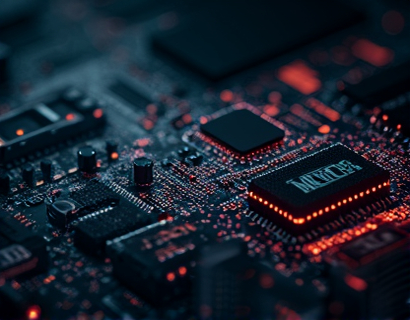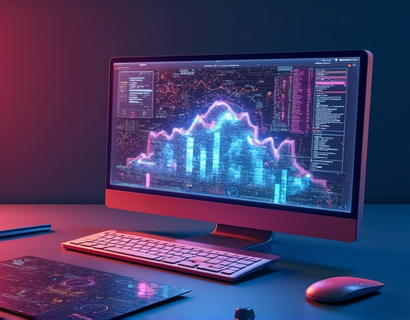Decentralized Business Transactions: Streamlining Interactions with Advanced dApp Solutions
In the rapidly evolving landscape of digital commerce, the need for secure, transparent, and efficient business transactions has become paramount. Traditional centralized systems often fall short in meeting these requirements, leading to increased reliance on decentralized applications, or dApps, which leverage blockchain technology to revolutionize the way businesses interact and conduct transactions. This article delves into the transformative power of decentralized applications, focusing on how they streamline complex interactions, ensuring a new standard for digital commerce.
The core principle behind decentralized applications is to remove the intermediary, allowing direct peer-to-peer interactions. This shift not only enhances security and transparency but also reduces costs and increases efficiency. By utilizing blockchain technology, dApps create an immutable and tamper-proof ledger of transactions, which is visible to all participants. This level of transparency builds trust among users, a critical factor in fostering robust business relationships in the digital age.
Understanding Decentralized Applications
Decentralized applications, or dApps, are software applications that run on a blockchain or a peer-to-peer network rather than on a central server. Unlike traditional applications, dApps are not controlled by any single entity, making them resistant to censorship and downtime. The decentralized nature of these applications ensures that no single point of failure exists, enhancing reliability and security.
At the heart of a dApp is a smart contract, a self-executing contract with the terms of the agreement directly written into code. Smart contracts automatically enforce and execute the terms of a transaction when predefined conditions are met. This automation eliminates the need for intermediaries, reducing transaction costs and speeding up processes. The use of smart contracts in dApps ensures that business logic is transparently and consistently applied, reducing the risk of fraud and errors.
Enhancing Security and Transparency
One of the most significant advantages of using dApps for business transactions is the enhanced security and transparency they provide. Blockchain technology ensures that every transaction is recorded in a public ledger, which is accessible to all participants. This transparency makes it nearly impossible to alter transaction records without consensus from the network, thereby preventing fraudulent activities.
Moreover, the cryptographic techniques used in blockchain ensure that transactions are secure and private. Each transaction is encrypted and linked to the previous one, forming a chain that is extremely difficult to manipulate. This level of security is particularly crucial for businesses handling sensitive data and high-value transactions, as it provides a robust defense against cyber threats.
Streamlining Complex Transactions
Decentralized applications are particularly effective in streamlining complex business transactions that involve multiple parties and steps. Traditional centralized systems often require extensive paperwork, intermediaries, and manual verification, leading to delays and increased costs. In contrast, dApps automate these processes through smart contracts, ensuring that each step is executed precisely and efficiently.
For instance, in supply chain management, a dApp can track the movement of goods from the manufacturer to the end consumer. Each transaction, from production to delivery, is recorded on the blockchain, providing a transparent and verifiable record. This not only enhances traceability but also ensures compliance with regulatory requirements, reducing the risk of disputes and errors.
Empowering User Connections and Collaborations
The decentralized nature of dApps fosters a more collaborative and interconnected digital ecosystem. Users can interact directly with each other without the need for intermediaries, building stronger and more trustworthy relationships. This direct interaction is particularly beneficial for businesses looking to establish partnerships, collaborate on projects, or engage in peer-to-peer marketplaces.
dApps also facilitate the creation of decentralized autonomous organizations (DAOs), which are community-driven entities governed by smart contracts. DAOs allow members to propose, vote on, and execute decisions collectively, promoting a more democratic and inclusive approach to business governance. This model is especially appealing for startups and innovative projects that value community input and decentralized decision-making.
Use Cases in Various Industries
The applications of dApps extend across various industries, each benefiting from the unique advantages they offer. In finance, decentralized finance (DeFi) platforms provide access to a wide range of financial services, including lending, borrowing, and trading, without the need for traditional banking infrastructure. These platforms offer higher returns and greater financial inclusion, making them attractive to both individuals and businesses.
In the real estate sector, dApps can streamline property transactions by creating digital representations of property ownership. This reduces the need for physical documents and intermediaries, making the process faster and more secure. Similarly, in the healthcare industry, dApps can ensure the secure and privacy-preserving sharing of medical records among healthcare providers, enhancing patient care and compliance with data protection regulations.
Challenges and Considerations
While the potential of decentralized applications is vast, there are several challenges and considerations that businesses must address. One of the primary concerns is the regulatory landscape, as the use of blockchain and smart contracts is still evolving and varies significantly across jurisdictions. Businesses must stay informed about local and international regulations to ensure compliance and avoid legal issues.
Another challenge is the technical complexity associated with developing and maintaining dApps. Businesses need to invest in skilled developers and robust infrastructure to create and sustain these applications. Additionally, user adoption depends on the ease of use and accessibility of dApps, which requires intuitive user interfaces and comprehensive onboarding processes.
The Future of Decentralized Interactions
As blockchain technology continues to mature, the capabilities and adoption of decentralized applications are expected to grow exponentially. The integration of advanced features such as interoperability, scalability, and enhanced user experiences will further solidify the role of dApps in the digital economy. Businesses that embrace these innovations will be better positioned to thrive in a decentralized world, leveraging the benefits of secure, transparent, and efficient interactions.
The future of decentralized interactions is not just about technology; it's about creating a more equitable and resilient digital ecosystem. By empowering users and businesses to connect and collaborate directly, dApps are paving the way for a new era of digital commerce. As more organizations recognize the value of decentralized solutions, the adoption of dApps will continue to expand, transforming the way we conduct business in the digital age.










































